|
Books Should Be Free Loyal Books Free Public Domain Audiobooks & eBook Downloads |
|
|
Books Should Be Free Loyal Books Free Public Domain Audiobooks & eBook Downloads |
|
Fiction |
|---|
|
Book type:
Sort by:
View by:
|
By: Edgar Rice Burroughs (1875-1950) | |
|---|---|
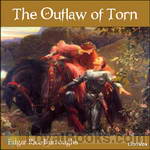 The Outlaw of Torn
The Outlaw of Torn
The story is set in 13th century England and concerns the fictitious outlaw Norman of Torn, who purportedly harried the country during the power struggle between King Henry III and Simon de Montfort. Norman is the supposed son of the Frenchman de Vac, once the king's fencing master, who has a grudge against his former employer and raises the boy to be a simple, brutal killing machine with a hatred of all things English. His intentions are partially subverted by a priest who befriends Norman and teaches him his letters and chivalry towards women... | |
 The Oakdale Affair
The Oakdale Affair
Edgar Rice Burroughs’ Jack London / H.H. Knibbs-inspired, selfless, poetry-spouting, hobo character, Bridge, makes another appearance in the novellete, The Oakdale Affair (original title, Bridge and the Oskalooska Kid.) Joining the poetic hobo in this gothic-like tale are many other unusual elements: dark mysterious nights, a deserted haunted farmhouse, a violent thunderstorm, the Oskalooska Kid, a nameless girl, thieves and murderers, Beppo the bear, and other surprises.The Oakdale Affair is a deep mystery and would puzzle even Sherlock Holmes.(Introduction by Ralph Snelson) | |
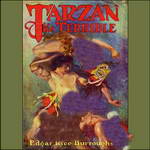 Tarzan the Terrible
Tarzan the Terrible
In the previous novel, during the early days of World War I, Tarzan discovered that his wife Jane was not killed in a fire set by German troops, but was in fact alive. In this novel two months have gone by and Tarzan is continuing to search for Jane. He has tracked her to a hidden valley called Pal-ul-don, which means "Land of Men." In Pal-ul-don Tarzan finds a real Jurassic Park filled with dinosaurs, notably the savage Triceratops-like Gryfs, which unlike their prehistoric counterparts are carnivorous... | |
 The Efficiency Expert
The Efficiency Expert
Our hero, Jimmy Torrance, Jr., has a hard time finding suitable employment after a brilliant (athletically, at least) college career, despite all kinds of assistance from his friends in the underworld and the wealthy and sophisticated young woman with whom he falls in love. Set in contemporary America, mostly Chicago, this 1921 short novel is one of a handful of Burrough’s works that does not take us to a fantasy or an exotic setting. (Delmar H. Dolbier) | |
 Tarzan the Untamed
Tarzan the Untamed
This book follows Tarzan and the Jewels of Opar chronologically. The action is set during World War I. While away from his plantation home in East Africa, invading German troops destroy it and kill his wife Jane and the Waziri warrior Wasimbu who is left crucified. Tarzan's search for vengeance is filled with much danger, many fierce fights and tons of action as he becomes active in the war on the British side. This is really just the start of the exciting adventures portrayed in this book. | |
By: Homer | |
|---|---|
 The Odyssey
The Odyssey
A wandering king who's a war-hero doomed to roam the earth by a vengeful God, a plethora of fantastic experiences, a wife battling the invasion of suitors who wish to replace her missing husband, a son in search of his father - the Odyssey is a rich tapestry of incredible experiences and unforgettable characters. A must-read classic for anyone who wants to understand the fundamentals of Western mythology, it is a sequel to the Illiad which recounts the magnificent saga of the Trojan War. The Odyssey continues on, describing the trials and tribulations of the Greeks under the leadership of Odysseus... | |
By: Rudyard Kipling (1865-1936) | |
|---|---|
 The Jungle Book
The Jungle Book
Originally written for his young daughter Josephine, who died tragically aged six, The Jungle Book by Rudyard Kipling is a collection of short stories which were published separately in magazines before being compiled into a book. The stories are in the form of fables, where animals communicate and speak to each other as humans do and the purpose of each story was to convey a moral or message to the reader. Modern readers would be more familiar with the Disney animated version in which Mowgli the little “man-cub” is raised by wolves... | |
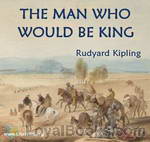 The Man Who Would Be King
The Man Who Would Be King
The Man Who Would Be King tells the story of two British adventurers in British India who become kings of Kafiristan, a remote part of Afghanistan. It was inspired by the exploits of James Brooke, an Englishman who became the “white Raja” of Sarawak in Borneo, and by the travels of American adventurer Josiah Harlan, who claimed the title Prince of Ghor. The story was first published in The Phantom Rickshaw and other Tales (Volume Five of the Indian Railway Library, published by A H Wheeler & Co of Allahabad in 1888)... | |
 The Second Jungle Book
The Second Jungle Book
Kipling shows his love of the sub continent and its people and understanding of their beliefs in these tales. An older Mowgli roams the jungle with his old friends and investigates the ways of his people, a Prime Minister becomes wandering holy man, scavengers tell their tale and we leave India for the far,far north of Canada. | |
 American Notes
American Notes
In American Notes, Rudyard Kipling, the Nobel Prize-winning author of the Jungle Book, visits the USA. As the travel-diary of an Anglo-Indian Imperialist visiting the USA, these American Notes offer an interesting view of America in the 1880s. Kipling affects a wide-eyed innocence, and expresses astonishment at features of American life that differ from his own, not least the freedom (and attraction) of American women. However, he scorns the political machines that made a mockery of American democracy, and while exhibiting the racist attitudes that made him controversial in the 20th century concludes “It is not good to be a negro in the land of the free and the home of the brave... | |
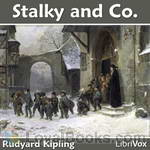 Stalky and Co.
Stalky and Co.
Rudyard Kipling published Stalky & Co. in 1899. Set at an English boarding school in a seaside town on the North Devon coast. (The town, Westward Ho!, is not only unusual in having an exclamation mark, but also in being itself named after a novel, by Charles Kingsley.) The book is a collection of linked short stories, with some information about the eponymous Stalky’s later life. Beetle, one of the main trio, is said to be based on Kipling himself, while Stalky may be based on Lionel Dunsterville... | |
 Puck of Pook's Hill
Puck of Pook's Hill
Puck of Pook’s Hill is a children’s book by Rudyard Kipling, published in 1906, containing a series of short stories set in different periods of history. The stories are all told to two children living near Pevensey by people magically plucked out of history by Puck. | |
 Plain Tales from the Hills
Plain Tales from the Hills
Named a "prophet of British imperialism" by the young George Orwell, and born in Bombay, India, Rudyard Kipling had perhaps the clearest contemporary eye of any who described the British Raj. According to critic Douglas Kerr: "He is still an author who can inspire passionate disagreement and his place in literary and cultural history is far from settled. But as the age of the European empires recedes, he is recognised as an incomparable, if controversial, interpreter of how empire was experienced. That, and an increasing recognition of his extraordinary narrative gifts, make him a force to be reckoned with." This force shines in THE PLAIN TALES FROM THE HILLS. (Introduction by Mike Harris) | |
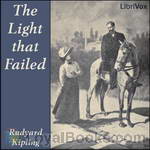 The Light that Failed
The Light that Failed
This novel, first published in 1890, follows the life of Dick Heldar, a painter. Most of the novel is set in London, but many important events throughout the story occur in Sudan or India. It was made into a 1916 film with Jose Collins and a 1939 film by Paramount starring Ronald Colman. | |
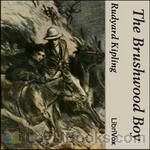 The Brushwood Boy
The Brushwood Boy
The experiences in public school, Sandhurst and military life in India of Major George Cottar together with his adventures in the dream world he discovers and frequents. | |
By: Miguel de Cervantes Saavedra (1547-1616) | |
|---|---|
 The Exemplary Novels of Miguel de Cervantes Saavedra
The Exemplary Novels of Miguel de Cervantes Saavedra
Originally compiled by Cervantes himself in 1613 as a collection of "exemplary" stories, this translated version from 1881 brings these stories to the English reader. Included in the collection are twelve stories selected by Cervantes, including "A Deceitful Marriage," which famously transitions seamlessly and humorously into the "Dialogue Between Scipio and Berganze". | |
By: Kenneth Grahame (1859-1932) | |
|---|---|
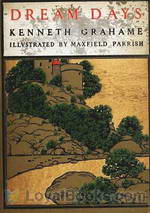 Dream Days
Dream Days
Dream Days is a collection of children’s fiction and reminiscences of childhood written by Kenneth Grahame. A sequel to Grahame’s 1895 collection The Golden Age (some of its selections feature the same family of five children), Dream Days was first published in 1898 under the imprint John Lane: The Bodley Head. (The first six selections in the book had been previously published in periodicals of the day—in the Yellow Book, the New Review, and in Scribner’s Magazine in the United States.) The book is best known for its inclusion of Grahame’s classic story The Reluctant Dragon... | |
By: Alexandre Dumas (1802-1870) | |
|---|---|
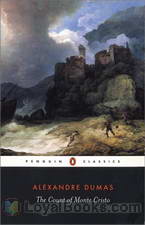 The Count of Monte Cristo
The Count of Monte Cristo
Written by French author Alexandre Dumas, The Count of Monte Cristo follows the life of Edmond Dantes as he embarks on a journey of revenge after being wrongly imprisoned and set up by none other than his so-called friends. Set during the years after the fall of Napoleon’s empire, the story unwinds in several locations including Paris, Marseilles, Rome, Monte Cristo and Constantinople. A handsome young sailor and soon to be ship captain Edmond Dantes seems to have it all in life, as he returns to Marseilles to wed the love of his life and fiancée, the beautiful Mercedes... | |
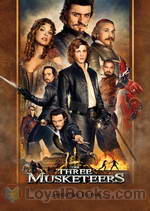 The Three Musketeers
The Three Musketeers
The Three Musketeers follows the adventures of the young Gascon nobleman, D’Artagnan and his three trusted friends who served as musketeers in the king’s regiment – Athos, Porthos & Aramis. Written by Alexandre Dumas, the book was a bestseller during the time of its publication and it remains so even today. It follows the timeless theme of friendship and bravery. The main protagonist of the story is D’Artagnan who travels to Paris to realize his dreams of becoming one of the musketeers for the king... | |
 Twenty Years After
Twenty Years After
First serialized from January to August, 1845, Twenty Years After is the second book in The D’Artagnan Romances, and follows the gallant adventures of the musketeers, as they are once again summoned to alleviate the various threats that lurk in the political scene of France, as the country is threatened by a possible uprising. Enriched with exciting and well-developed characters, the novel adds more detail to its familiar characters, as the musketeers have matured and are portrayed in a more introspective light... | |
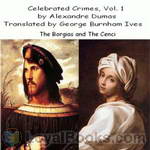 Celebrated Crimes
Celebrated Crimes
Dumas's 'Celebrated Crimes' was not written for children. The novelist has spared no language -- has minced no words -- to describe the violent scenes of a violent time.In some instances facts appear distorted out of their true perspective, and in others the author makes unwarranted charges. The careful, mature reader, for whom the books are intended, will recognize, and allow for, this fact.The first volume comprises the annals of the Borgias and the Cenci. The name of the noted and notorious Florentine family has become a synonym for intrigue and violence, and yet the Borgias have not been without stanch defenders in history... | |
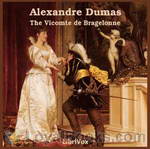 The Vicomte De Bragelonne
The Vicomte De Bragelonne
After The Three Muskateers and Twenty Years After the adventurous story of Athos, Porthos, Aramis and D'Artagnan continues!The Vicomte of Bragelonne: Ten Years Later (French: Le Vicomte de Bragelonne ou Dix ans plus tard) is the last of the Musketeer novels. It is usually divided into four volumes and this first volume contains chapters 1-75. | |
 The Black Tulip
The Black Tulip
The Black Tulip, written by Alexandre Dumas père and published in 1850, is a historical novel placed in the time of Tulipmania in the Netherlands. The novel begins with the 1672 politically motivated mob lynching of the de Witt brothers and then follows the story of Cornelius van Baerle, godson of Cornelius de Wit. Cornelius Van Baerle has joined the race to breed a truly black tulip – and to win the prize of 100,000 guilders, as well as fame and honour. As he nears his goal he is jailed and then of course rescued – by the beautiful Rosa, daughter of the jailer. | |
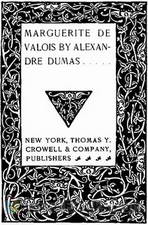 Marguerite de Valois
Marguerite de Valois
A historical fiction novel set in Paris (1572) during Charles IX's reign and the French Wars of Religion. Marguerite de Valois, daughter of deceased Henry II, is the novel's protagonist set against the infamous schemes of the Catholic power player, Catherine de Medici. | |
By: Daniel Defoe | |
|---|---|
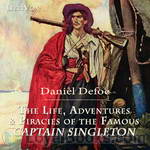 The Life, Adventures & Piracies of Captain Singleton
The Life, Adventures & Piracies of Captain Singleton
The Life, Adventures & Piracies of the Famous Captain Singleton is a "bipartite adventure story whose first half covers a traversal of Africa, and whose second half taps into the contemporary fascination with piracy. It has been commended for its depiction of the homosexual relationship between the eponymous hero and his religious mentor, the Quaker, William Walters.". | |
By: Oscar Wilde (1854-1900) | |
|---|---|
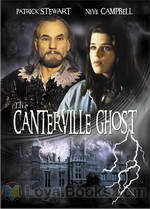 The Canterville Ghost
The Canterville Ghost
An American diplomat's family moves into an ancient stately mansion. They're warned by the owner that it is haunted by a most horrifying and gruesome spirit who had once cruelly murdered his own wife. The story progresses with creaking floor boards, mysterious passages, dark attics, clanking chains, and weird howling. Yet, the reader is totally unprepared for Oscar Wilde's brand of tongue in cheek humor as he takes all the ingredients of a traditional ghost story and turns it on its head, and creates a hilarious parody instead of a morbid saga! The Canterville Ghost was the first of Oscar Wilde's short stories to be published... | |
 The Happy Prince and Other Tales
The Happy Prince and Other Tales
The Happy Prince and Other Tales (also sometimes called The Happy Prince and Other Stories) is an 1888 collection of stories for children by Oscar Wilde. It is most famous for The Happy Prince, the short tale of a metal statue who befriends a migratory bird. Together, they bring happiness to others, in life as well as in death. The stories included in this collection are:The Happy PrinceThe Nightingale and the RoseThe Selfish GiantThe Devoted FriendThe Remarkable RocketThe stories convey an appreciation for the exotic, the sensual and for masculine beauty. | |
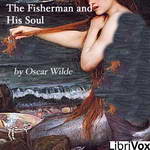 The Fisherman and His Soul
The Fisherman and His Soul
”The Fisherman and his Soul” is a fairy tale first published in November of 1891 in Wilde’s “A House of Pomegranates”. It tells of a fisherman who nets and falls in love with a mermaid. But to be with her he must shed his soul, which goes off to have adventures of its own. Will forbidden love endure? | |
 The Soul of Man
The Soul of Man
“(T)he past is what man should not have been. The present is what man ought not to be. The future is what artists are.”Published originally as “The Soul of Man Under Socialism,” this is not so much a work of sober political analysis; rather it can be summed up as a rhapsodic manifesto on behalf of the Individual. Socialism having deployed technology to liberate the whole of humanity from soul-destroying labour, the State obligingly withers away to allow the free development of a joyful, anarchic hedonism... | |
By: Herman Melville (1819-1891) | |
|---|---|
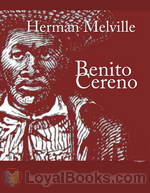 Benito Cereno
Benito Cereno
On an island off the coast of Chile, Captain Amaso Delano, sailing an American sealer, sees the San Dominick, a Spanish slave ship, in obvious distress. Capt. Delano boards the San Dominick, providing needed supplies, and tries to learn from her aloof and disturbed captain, Benito Cereno, the story of how this ship came to be where she is. Dealing with racism, the slave trade, madness, the tension between representation and reality, and featuring at least one unreliable narrator, Melville's novella has both captivated and frustrated critics for decades. | |
 Omoo: A Narrative of Adventures in the South Seas
Omoo: A Narrative of Adventures in the South Seas
Omoo: A Narrative of Adventures in the South Seas is Herman Melville's sequel to Typee, and, as such, was also autobiographical. After leaving Nuku Hiva, the main character ships aboard a whaling vessel which makes its way to Tahiti, after which there is a mutiny and the majority of the crew are imprisoned on Tahiti. The book follows the actions of the narrator as he explores Tahiti and remarks on their customs and way of life.Many sources incorrectly assert that Omoo is based on Melville's stay in the Marquesas. The novel is, in fact, exclusively based on his experiences in the Society Islands. | |
 The Confidence-Man: His Masquerade
The Confidence-Man: His Masquerade
The Confidence-Man: His Masquerade was the last major novel by Herman Melville, the American writer and author of Moby-Dick. Published on April 1, 1857 (presumably the exact day of the novel's setting), The Confidence-Man was Melville's tenth major work in eleven years. The novel portrays a Canterbury Tales-style group of steamboat passengers whose interlocking stories are told as they travel down the Mississippi River toward New Orleans. The novel is written as cultural satire, allegory, and metaphysical treatise, dealing with themes of sincerity, identity, morality, religiosity, economic materialism, irony, and cynicism... | |